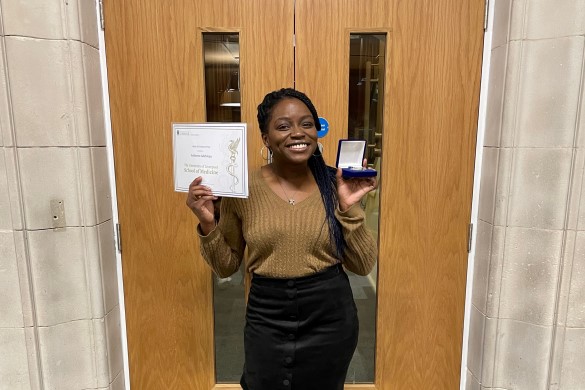
Medical student Anthonia Adefolaju has recently received the Spirit of Liverpool School of Medicine Prize for her instrumental role in the development of an inclusive School community that celebrates diversity.
Anthonia has led on initiatives to continue to develop a learning environment where all students feel safe and included, not least through her role as student advisor in the development of a training programme around microaggressions, which the School is proud to have led in partnership with the Anthony Walker Foundation, Health Education England and NHS Trusts in Merseyside, Cheshire and Wirral and Lancashire.
On winning the award, Anthonia said: “I’m over the moon to have won the award!”
“I’ve loved being able to contribute in a small way to making our experiences of medical school a bit more comfortable and enjoyable, and hope to be able to continue this in the future! Thank you so much to my wonderful friends for nominating me!”
Anthonia was also named as one of Powerful Media’s Top 150 Future Leaders for 2021-22 in recognition of her advocacy and ambassadorship initiatives, including co-founding Liverpool BME Medics Society and acting as a Senior Ambassador for prospective students to the University of Liverpool.
Anthonia’s story
Here, Anthonia shares more about her journey so far with the University:
The road to Medicine
I’m London born, Essex raised. I went to an all-girls grammar school in Essex. I always knew I was into sciences, and I knew I needed a career that could accommodate me being a chatty person!
By the end of year 11, I was considering three degree paths: Maths, Psychology or Medicine. Medicine for me seemed like the best way to combine my love for working with people with my interest in science.
I remember how cold the Crypt was on my interview day! The interview itself was a nerve wrecking time (as most interviews are!) but more than anything, I recall the two Year Five student doctors who were in charge of the debriefing area after the interview. They took the time to really answer all of our questions and genuinely seemed to care about how we were feeling about the whole process. They were so confident and warm.
In a stark contrast to other results days I’d had in the past, I actually remember sleeping really well the night before A level results day! The day itself was a really happy day – I found out I got into Liverpool and then headed off for a shift at my job at the time! I did celebrate with my family after though.
Starting out at Liverpool
I still remember my first day sat in the (now defunct) Duncan building for my first lecture and feeling so lucky to be there. I also recall being confused during many embryology lectures there too – swings and roundabouts!
My first couple of weeks on the course were made so special because everyone was so open and friendly!
Everyone was so willing to have a chat, and this enabled me to make some absolutely wonderful friends who have been in my life ever since.
I love getting involved with initiatives that make life a bit easier for the next set of students coming after me! This is what drew me to my roles as a Liverpool Advocate and School of Medicine Peer Mentor and tutor!
It’s so amazing to chat to prospective and current student doctors and give them tips and advice that I wish I’d heard before and during medical school!
Beyond my studies
Outside of my studies, I am on the committees of Students for Global Health Liverpool, Liverpool Paediatric Society and Decolonise University of Liverpool, and a member of lots of others too.
A couple of student doctors and I decided to found Liverpool Black and Minority Ethnics (BME) Medics Society because we felt there was a need to foster a community where we could share and discuss our experiences on and off the wards.
I’m over the moon to see how many students have been touched by our society, whether it’s been through teaching sessions or having that space to be unapologetically themselves and talk about their own experiences.
Being a student advisor for the NHS microaggressions awareness training initiative was a really eye-opening experience. Part of this process involved the team collecting experiences from student doctors in which they had been a victim of a microaggression. It was really quite harrowing hearing these experiences, and it was clear that something had to be done to make sure these incidents become few and far between.
Although this is just an initial step, I’m very happy to have been able to contribute to the creation of this resource! I look forward to seeing this tool implemented across the NHS, and I hope to be a part of the continued efforts to decrease and stop the instances of these sorts of events in healthcare settings.
Looking ahead
To be honest, I was a little bit on the fence when deciding to intercalate initially. Global Health was always a particularly interesting field to me, so I decided to send in a couple of applications to study this. I ended up intercalating at Imperial College London, and it was one of the best experiences ever.
Global Health really brings the intersectionality of sciences and social sciences together and makes you look at medicine through a different lens. Even though it was online, I really had a good time meeting new people and taking a little break from medicine!
Right now, I’m not too sure what specialty I want to go into, but I know I want to continue with mentorship and advocacy in the future.